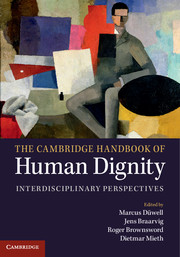Book contents
- Frontmatter
- Contents
- List of contributors
- Foreword
- Why a handbook on human dignity?
- Acknowledgments
- 1 Human dignity from a legal perspective
- 2 Human dignity: concepts, discussions, philosophical perspectives
- Part I Origins of the concept in European history
- 3 Meritocratic and civic dignity in Greco-Roman antiquity
- 4 Human dignity in the Middle Ages (twelfth to fourteenth century)
- 5 Human dignity in late-medieval spiritual and political conflicts
- 6 Human dignity in Renaissance humanism
- 7 The Council of Valladolid (1550–1551): a European disputation about the human dignity of indigenous peoples of the Americas
- 8 Martin Luther's conception of human dignity
- 9 Natural rights versus human dignity: two conflicting traditions
- 10 Rousseau and human dignity
- 11 Human dignity and socialism
- 12 Human dignity in the Jewish tradition
- Part II Beyond the scope of the European tradition
- Part III Systematic conceptualization
- Part IV Legal implementation
- Part V Conflicts and violence
- Part VI Contexts of justice
- Part VII Biology and bioethics
- Appendix 1 Further reading
- Appendix 2 Universal Declaration of Human Rights
- Index
- References
4 - Human dignity in the Middle Ages (twelfth to fourteenth century)
from Part I - Origins of the concept in European history
Published online by Cambridge University Press: 05 March 2015
- Frontmatter
- Contents
- List of contributors
- Foreword
- Why a handbook on human dignity?
- Acknowledgments
- 1 Human dignity from a legal perspective
- 2 Human dignity: concepts, discussions, philosophical perspectives
- Part I Origins of the concept in European history
- 3 Meritocratic and civic dignity in Greco-Roman antiquity
- 4 Human dignity in the Middle Ages (twelfth to fourteenth century)
- 5 Human dignity in late-medieval spiritual and political conflicts
- 6 Human dignity in Renaissance humanism
- 7 The Council of Valladolid (1550–1551): a European disputation about the human dignity of indigenous peoples of the Americas
- 8 Martin Luther's conception of human dignity
- 9 Natural rights versus human dignity: two conflicting traditions
- 10 Rousseau and human dignity
- 11 Human dignity and socialism
- 12 Human dignity in the Jewish tradition
- Part II Beyond the scope of the European tradition
- Part III Systematic conceptualization
- Part IV Legal implementation
- Part V Conflicts and violence
- Part VI Contexts of justice
- Part VII Biology and bioethics
- Appendix 1 Further reading
- Appendix 2 Universal Declaration of Human Rights
- Index
- References
Summary
Any discourse on human dignity presupposes a specific anthropology. This is equally true for reflection on human dignity in the Middle Ages. The medieval efforts to interpret the human being occur in dialogue with two kinds of sources: on the one hand with biblical statements regarding the human being, and on the other hand with works from antiquity along with the Arabic and Jewish texts that discuss these works. Of interest in the first tradition is primarily the interpretation of the human being as the image of God, expressed most notably in Genesis 1:26 and Wisdom 2:23. At the core of the influence of ancient philosophy, in contrast, is the interpretation of the human being as animal rationale and as animal sociale and politicum. While the decisive texts of Aristotle in which this twofold designation of human beings is developed (the Nicomachean Ethics and Politics) only became fully accessible to the Latin world in the course of the thirteenth century, the notion of humans as rational beings had never sunk into oblivion. From ancient philosophy, Christian speculation had taken the problem of immortality, while the theme of beatitude and the final destination of humans in relation to eternal bliss and the sight of God was taken up and strongly enriched by theological reflection. This also holds for the development of the notion of a person, which was deepened in the light of the Trinitarian debate. What may not be overlooked is the propagation and redevelopment of ethics through the interaction not only with biblical guidelines, but especially through the questions of sin, grace, and the proper way to live one's life.
- Type
- Chapter
- Information
- The Cambridge Handbook of Human DignityInterdisciplinary Perspectives, pp. 64 - 73Publisher: Cambridge University PressPrint publication year: 2014
References
- 5
- Cited by

